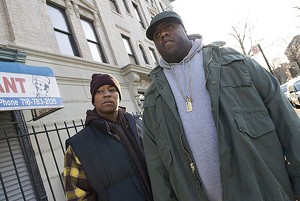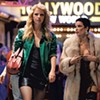Published January 21, 2009 at 6:28 a.m.
There’s an allure about artists with criminal records — from medieval poet François Villon to gangsta rappers. Their stories seem to offer both gritty realism and the promise of redemption through creativity. In today’s world of coldly test-marketed entertainment, it’s especially refreshing to find artists who live the stories they tell — and die by them.
So why is this movie about the life and death of The Notorious B.I.G. (a.k.a. Biggie Smalls, a.k.a. Christopher Wallace: 1972-1997) sort of boring? The answer is simple, like the movie: because the script made it that way. For all the on-screen blunt-smoking, nudity and cussing, this film about the rapper whose “East Coast-West Coast” feud with Tupac Shakur left them both dead offers few insights you wouldn’t find in a diva biopic on Lifetime. In brief: Family is important. Fame corrupts. And finally, when a man croons reassuringly to a woman, “Don’t worry, baby, I got you,” she should expect him to cheat on her within the week.
Directed by George Tillman Jr., who wrote and directed Soul Food and produced the popular Barbershop series, Notorious has a certain amount of jumpy kinetic energy. It depicts Biggie’s native Brooklyn in stylishly desaturated colors, and sometimes captures the buzz of street life. Mainly, though, it stays focused on the main narrative, in which a plump, bespectacled Catholic schoolboy named Chris discovers he can raise his cool quotient by selling crack. A few years later, Biggie (now played by Jamal Woolard) wins a rap battle on the street, and his friends encourage him to record a demo. One even utters the classic line, “I know people who know people” — only now it’s “I know muthafuckas who know muthafuckas.”
Woolard comes alive onstage, and the film’s best scenes recreate Biggie’s performances, with Tillman’s camera darting into the audience to convey its volatile moods. Offstage, though, he’s not that strong a personality, despite his hulking physical presence. One funny scene captures Biggie’s unorthodox method of composition. (“Get me some Diet Pepsi. And some weed. And some females,” he orders an underling as he prepares for an all-nighter.) Mostly, though, the star’s life comes off as a succession of ill-fated romantic relationships and scoldings from his single mom (Angela Bassett, wasted here), who just wants him to be a nice, responsible boy.
In short, it’s the sort of portrait where the supporting figures seem more interesting than the star. As producer Sean “Puffy” Combs, Derek Luke looks nothing like Diddy, but he raises questions about what happens when street art becomes big business. Naturi Naughton fizzes with anger as Lil’ Kim, the girlfriend whom Biggie helps shape into a sexy superstar. Her story poses even tougher questions about the role of women in hip-hop, as she mutates from a tentative versifier into a scary stage siren who doesn’t mind being a ho as long as she can set her price. Now there’s a subject for a biopic — but Lil’ Kim’s still alive and, like Diddy, busy embarrassing herself on reality TV.
Then there’s Tupac. As Biggie’s voiceover struggles to capture the firebrand’s contradictions, it’s hard not to wish we could hear more about him — but, hey, there are other books and movies for that. This film doesn’t wade into the debates surrounding both deaths: It simply portrays B.I.G. as a guy who was pulled into the orbit of a mad genius and forced to live out a “feud” that was part hype. (A montage of anonymous fans suggests the bitter grassroots of the East-West rivalry but doesn’t provide any larger context.)
Given that Biggie was slain at 24, screenwriters Reggie Rock Bythewood and Cheo Hodari Coker practically have to huff and puff to give his story a semblance of upbeat resolution. By the end, he’s become a role model to anyone who wants to give a voice to the streets — just as, by the end of Milk, Harvey Milk is a role model to young gay men everywhere.
There’s nothing wrong with role models. But once in a while, it would be nice to see a biopic about someone who died young with all his or her warts intact.
More By This Author
Speaking of Movies, movie Review
-

Next Month Brings the Final Curtain for Palace 9 Cinemas
Oct 27, 2023 -

Book Review: 'Save Me a Seat! A Life With Movies,' Rick Winston
Aug 30, 2023 -

Steve MacQueen Named Executive Director of Vermont International Film Festival
May 22, 2023 -

Vermonters Are Going Back to the Movies — Under the Stars
Aug 26, 2020 -

Where to Catch a Movie Near Burlington
Sep 11, 2018 - More »
Comments
Comments are closed.
From 2014-2020, Seven Days allowed readers to comment on all stories posted on our website. While we've appreciated the suggestions and insights, right now Seven Days is prioritizing our core mission — producing high-quality, responsible local journalism — over moderating online debates between readers.
To criticize, correct or praise our reporting, please send us a letter to the editor or send us a tip. We’ll check it out and report the results.
Online comments may return when we have better tech tools for managing them. Thanks for reading.










































